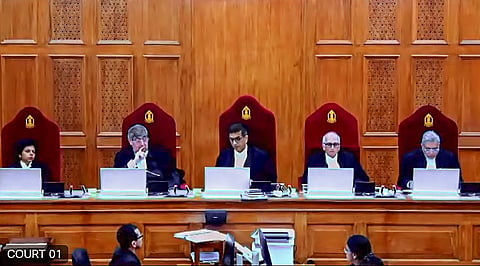

Today, October 17, the verdict on a plea regarding same-sex marriage was delivered by the Supreme Court and a five-judge constitutional bench of the court unanimously refused to accord legal recognition to same-sex marriage under the Special Marriage Act, ruling that it is within Parliament's ambit to change the law for validating such unions, as stated in a report by PTI.
The apex court, while passing the verdict, was unanimous in holding that there is "no unqualified right" to marriage, and same-sex couples can't claim it as a fundamental right under the Constitution. The bench headed by Chief Justice of India DY Chandrachud was critical of the Centre's stand that the pleas for legal validation of same-sex marriage were reflective of an urban elitist concept.
The five-judge bench comprising the CJI, and Justices Sanjay Kishan Kaul, S Ravindra Bhat, Hima Kohli and PS Narasimha concurred on the main issue that the court can't accord legal validation to same-sex marriage under the Special Marriage Act, and said the task has to be performed by Parliament.
Students react
Speaking to EdexLive, students expressed their thoughts on whether this decision of the court is a win-win situation for them or not. "We are hurt and sad but we will keep fighting," said a student on condition of anonymity. Adding more, the student said, "The marriage equality verdict was a disappointing, albeit, not surprising outcome. The judgement touched upon a lot of aspects and yet, was without substance."
"It has been nine years since the NALSA judgement, wherein, the court said the same thing the court said today. Nothing has changed. Nothing will change if we keep relying on the court's reliance on the parliament," the student added.
Terming the judgement as 'utterly disappointing', a law student Ayan from National Law University Delhi (NLUD) said, "We didn't expect full marriage rights, but many people thought at least a limited recognition of civil unions would be granted, as well as derivative rights to cohabit, have joint accounts and so on. The court didn't do that either and delegated the job to a clearly unwilling government. Looking forward to seeing the response from the community to this."
A member from Yes, We Exist, a community which raises awareness about LGBTQIA+, said, "The Supreme Court of India and the Government of India has now told us clearly that we, the millions of LGBTQ+ Indians, are second class citizens who do not deserve equal rights. They failed to take into consideration how this impacts us, and how it deprives us of a life of dignity, happiness and safety. Why should we continue to love and serve a country that does not love us back?"
